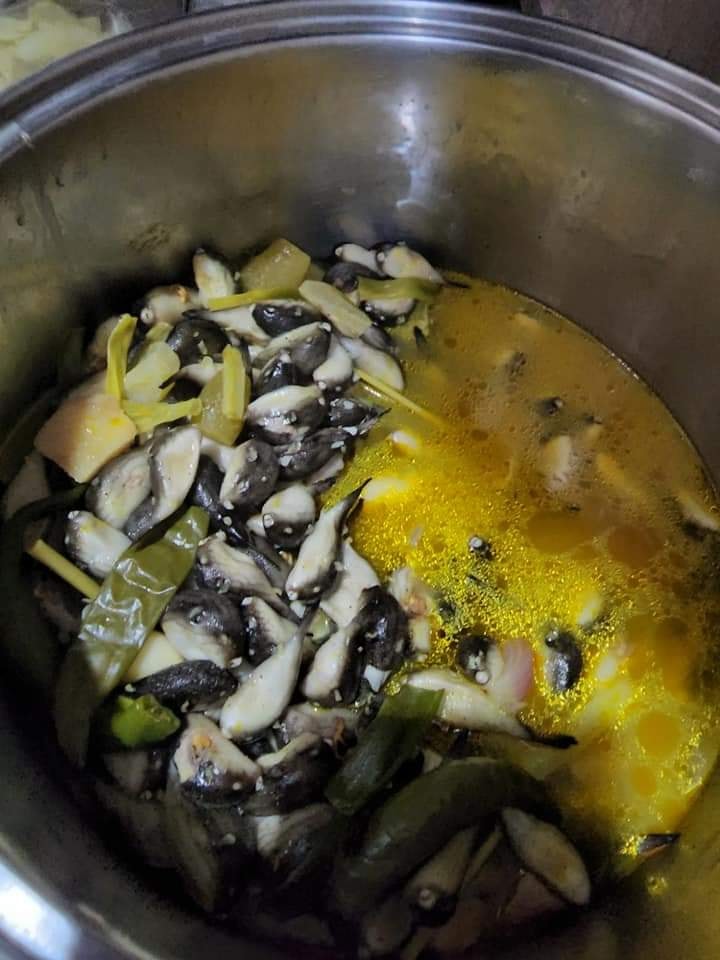
Pufferfish locally known as buriring when cooked properly is a delicacy to Cebuanos but when improperly cooked can be deadly as experienced by a family in Olango Island where the mother died and several members of the family got hospitalized after eating the fish they prepared for breakfast on August 3, 2020. | Contributed photo
LAPU-LAPU City, Philippines — A councilor of the Lapu-Lapu City Council has warned the public against eating pufferfish (buriring) after a 57-year-old mother died while several members of her family got admitted at the hospital after eating the fish on Wednesday morning, August 3, 2022.
Councilor Annabeth Cuizon, head of the committee on social welfare services, was referring to the family, who were poisoned by the pufferfish, which they ate for breakfast on that day, in Barangay Caubian, Olango Island.
“Usa ka pamilyahan ang nangahilo sa buriring gahapon diha sa isla sa Caubian. Mag amping ta ninyo labi na sa pagluto aning buriring,” Cuizon said on Thursday, August 4.
(A family were poisoned after they ate pufferfish in Caubian. Let us be careful in cooking this pufferfish.)
According to a 2019 CDN Digital report, pufferfish, which is a poisonous type of fish commonly found in tropical seas, is a delicacy among Cebuanos if properly prepared by a skilled cook — where venomous sacs will be extracted without contaminating parts of this fish.
But it could be deadly if not prepared properly.
Dr. Beethoven Bongon, toxicologist of Vicente Sotto Memorial Medical Center (VSMMC), said in the CDN report, that pufferfish contained toxins called tetrodotoxin which, if ingested, could attack the neurological system of a human being, usually manifested through numbness and severe paralysis in different parts of the body.
Bongon, who was interviewed in 2019 when a family living in one of the islets of Olango was hospitalized after eating pufferfish for breakfast, said there was no antidote for tetrodotoxin.
READ: VSMMC doctors look at causes other than pufferfish in the food poisoning of 8 family members
Cuizon, for her part, said in a statement today, August 4, that preparing pufferfish properly could make the fish edible.
“‘Buriring’ or pufferfish, when prepared well, can be edible. In fact, many of our residents in Olango eat this whenever available. One of the most popular kind [of dish made from pufferfish] is called “tagontongan,” which I have tried myself and find delicious,” said Cuizon.
“Pero, naa sa pagpreparar sa isda ang importante. Kung dugay na ka sige og luto og buriring, mahanas gyud ka. Naay daghang kamao ana diha sa Olango, Caubian, Caohagan ug Pangan-an,” she said.
(But what is important is in the preparation of the fish. If one has cooked pufferfish properly several times, one can be good in doing this properly. There are a lot of people, who knows how to cook this fish properly in Olango, Caubian, Caohagan and Pangan-an.)
In the latest “pufferfish poisoning,” the Lapu-Lapu City Police Office identified the fatality as Romana Evardo.
Police also said that family members of the Evardo family were also hospitalized at the Sta. Rosa Community Hospital after they ate pufferfish for breakfast that day.
Police identified them as Romana’s husband, Reynaldo, 57; and six other members of the family — Eugene, 32; Joseph, 30; Jordan, 28; and three minors whose ages were 9, 5, and 4 years old.
In an interview, Dr. Eris Augusto, head of the Sta. Rosa Community Hospital, said that the mother had eaten the internal organ of the pufferfish, where the toxins/poisons were believed to be located.
“Ang mama nakakaon siya sa gitawag nga sud sa tinai or katung bihod nakaon sa mama. So as stated, ang istorya sa amahan ug anak — mao tuy nakaingon nga nahilo siyag dali, grabe ang pagkahilo,” Augusto said.
(The mother had eaten what was called the insides of the fish. That was what the father and one of the adult children stated — that was the cause of why the mother was quickly poisoned [after eating the fish].)
Police investigation showed that the husband, who was a fisherman, caught the pufferfish that morning.
They then cooked it and ate it at breakfast.
A few hours later, the family fell ill and was brought to the hospital for treatment.
Cuizon said that she already visited the victims and given them assistance.
“Human nato maistorya ang usa sa pamilya, iyang gi-ingon nga buriring nga gagmay ug tunok,” Cuizon added.
(After we spoke to one of the members of the family, she said that the pufferfish they ate was a small fish with small spikes.)
Aside from that, she also sent her condolences to the family for their loss.
“Sa nahitabo sa pamilya ni Evardo diin namatay gyud ang mama nga maoy nag preparar sa pagluto sa buriring, atong gipaabot ang atong kinasing-kasing nga pahasubo,” she said.
(To what happened to Evardo family where the mother, who was preparing the pufferfish died, we sent our heartfelt condolences.)
“Dili lalim ang ilang nahi-aguman, busa kita nitunol sa atong personal nga ayuda sa pamilya ug atong gi-awhag ang CSWDO to provide assistance also to the family such as burial and food assistance. Mag amping ta tanan,” Cuizon said.
(What the family went through is not an easy one, so we also give this personal assistance to the family, and we encourage the CSWDO [City Social Welfare Development Office] to provide assistance also to the family such as burial and food assistance. Take care everyone.) | with CDN Digital report (Updated story)
RELATED STORIES
Pufferfish: a meal deadlier than cyanide
Man paralyzed, another sent into coma by puffer fish still in hospital
/dbs

